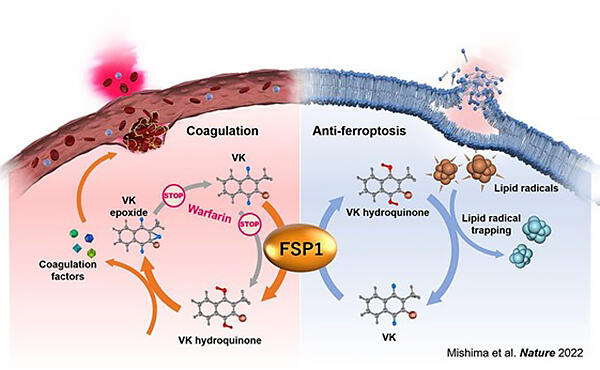The research group of Dr. Eikan Mishima (currently a Senior Scientist at the Helmholtz Zentrum München in Germany), Professor Takaaki Abe of the Tohoku University School of Medicine, along with Assistant Professor Junya Ito and Professor Kiyotaka Nakagawa of the Graduate School of Agricultural Science at Tohoku University has newly discovered that vitamin K efficiently inhibits ferroptosis (lipid oxidation-dependent cell death), in addition to also identifying FSP1 as an enzyme that reduces vitamin K, which had been a mystery for 50 years. According to Dr. Mishima, "High concentrations of vitamin K may be used as therapeutic agents to treat diseases that are associated with ferroptosis. We also believe that the role of vitamin K may have changed during the evolution of bacteria, plants, and humans." The results were published in Nature.

Provided by Tohoku University
Ferroptosis is involved in neurodegenerative diseases such as Alzheimer's disease and drug sensitivity in cancer cells, so research and development is being carried out all over the world for therapeutic drug targets. Dr. Mishima thought, "Maybe there is a metabolite in the body that can suppress ferroptosis," so he screened various vitamins and other substances and found that vitamin K inhibited ferroptosis at lower concentrations than vitamin E. In particular, experiments in which vitamin K was administered to liver-specific Gpx4-deficient mice, etc. revealed that, amongst vitamin K, the menaquinone 4 (MK4) contained in meat and eggs most strongly suppressed cell death.
Investigating the mechanism revealed that, although vitamin K itself has no antioxidative action, the reduced form of vitamin K acts as a strong antioxidant and traps lipid radicals, thereby preventing ferroptosis. Additionally, as a result of examining the function of FSP1 in the vitamin K metabolic cycle involved in blood coagulation, the research group found that FSP1 is responsible for warfarin-independent vitamin K reduction. The discovery of this enzyme is an important report that clarified the last remaining mystery of the vitamin K cycle involved in blood coagulation, and that also clarified why vitamin K acts as an antidote to poisoning from overdoses of the anticoagulant warfarin.
Ferroptosis is considered to be one of the oldest types of cell deaths in evolution. In the primitive Earth environment where oxygen was scarce, vitamin K played a role as an antioxidant action against ferroptosis stresses such as heat, ultraviolet rays, and iron, but, in an oxygen-rich environment, the coenzyme Q10 may have come to play this role in mitochondria. Dr. Mishima says that, in the future, he will also conduct research on the role of vitamin K in the evolution of life.
This article has been translated by JST with permission from The Science News Ltd.(https://sci-news.co.jp/). Unauthorized reproduction of the article and photographs is prohibited.




